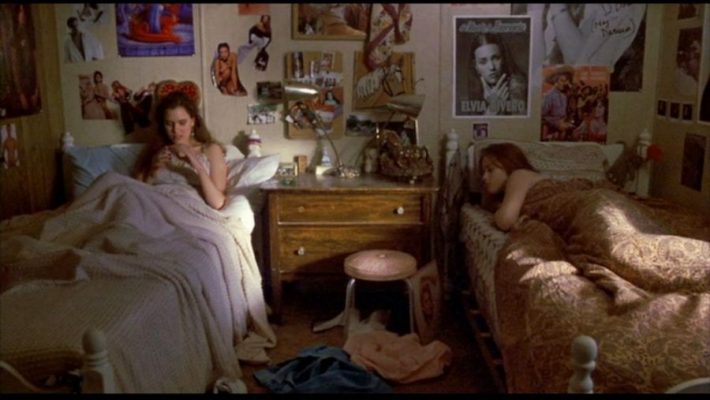Available on Blu-ray Mon 12 Nov 2018
If the name Allison Anders isn’t familiar, it’s not surprising; of the directors who came to prominence in the American independent film boom of the late 80’s and early 90’s Anders never quite sustained her initial momentum. While the likes of Steven Soderbergh, Kathryn Bigelow, Robert Rodriguez, Richard Linklater and Quentin Tarantino became household names, Anders has remained in relative obscurity. While being involved in the ill-conceived Four Rooms didn’t do her career any favours, the low-key, slice-of-life family drama Gas Food Lodging offers a few clues why she’s remained comparatively uncelebrated, although it has many virtues in its own right.
Single mother Nora (Brooke Adams) struggles to make ends meet bringing up two teenage daughters in a trailer park in Laramie, New Mexico. Trudi (Ione Skye) is willful, rebellious and promiscuous, while younger sister Shade (Faruza Balk) is kinder, thoughtful, and more reserved, frequently seeking solace in the joys of the Spanish-language weepies at the local fleapit, featuring lachrymose fictional actress Elvia Rivero. The film depicts the relationships of the mother and daughters and the series of various men – potential boyfriends, lovers and father figures – that drift in and out of their lives.
Anders’ approach is a spare, intimate and rigorously realist, falling somewhere between the documentary approach of The Bicycle Thieves and the rolling melancholic rhythms of Jim Jarmusch. We see the film through the perspective of Shade, a wise move given she’s the most instinctively likeable of the three main protagonists and Balk is the standout. Voiceovers can take you out of a film, but Balk’s hits a charming balance between adolescent naivety and the beginnings of fiercely intelligent and perceptive woman. This also gives Gas Food Lodging the sense of a coming-of-age tale, which puts us on familiar thematic ground, but also slightly unbalances the film towards Shade when most of the seismic life events depicted are experienced by Trudi. Because the film is so gently-paced and low-key, with the only hint of melodrama provided by Shade’s beloved Mexican dramas, it also comes perilously close to detachment. Life-changing events are portrayed in the same way most filmmakers would depict the most quotidian of moments.
Its understated nature can also be seen as its strength. The sense of stillness and inertia offers a thoroughly authentic small-town life. Laramie seems to exist curiously outside of time, with only Shade’s grungy sense of fashion offering some frame of reference; otherwise Laramie remains the kind of frontier town you could see in a million westerns, right down to the rolling tumbleweed Anders often knowingly utilises. The languid, wistful and plangent score from Dinosaur Jr‘s J. Mascis is perfect accompaniment to these lives drifting by. Perhaps the film simply came out at the wrong time. Anders’ confidence in stripping her story to the bones and letting her characters speak for themselves is admirable, and subsequent decades have given us the likes of Kelly Reichardt‘s sparse ‘slow cinema‘, Jarmusch’s own Paterson, and Greta Gerwig‘s Lady Bird, all of which feature similar concise and laconic storytelling. Fans of those works will find much to love in Gas Food Lodging; it feels like one of those pieces that’s been massively influential in its own quiet, unspectacular way.
